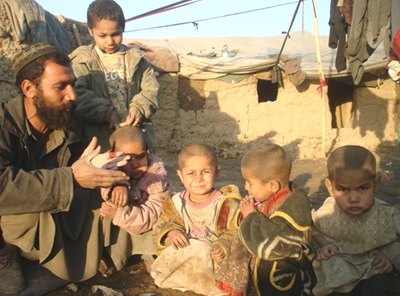KABUL - Azizullah's family left their home in the Sangin District of Helmand Province, southern Afghanistan, because of the worsening conflict, drought and food security situation. Their new home is a one-room mud-hut in the western outskirts of Kabul where over 4,500 internally displaced persons (IDPs) have established a makeshift camp.

Many IDPs say they cannot afford to feed their children and keep them warm in winter. (Photo: Ahmad/IRIN)
"We abandoned our home because of aerial strikes [by international forces] and brutalities by the Taliban," Azizullah told IRIN as his six bare-foot children huddled around him on a cold afternoon on 28 December.
"Because of the conflict I could not work and my children had nothing to eat… We have come here to live in peace and receive some assistance," he said.
The Ministry of Refugees and Returnees (MoRR) said about 770 IDP families (about 4,620 people) were living in the Charahi Qambar area of Kabul.
More than 200 families have sought refuge in the informal camp from the southern provinces of Helmand, Zabul and Uruzgan, according to camp residents. The camp is home to dozens of impoverished Kuchis (nomads), vulnerable returnees from Pakistan and conflict-affected households from different parts of the country.
Kabul is over 700km from Helmand Province and a difficult choice for IDPs who usually go to nearby areas or travel to Pakistan.
Most IDPs in the camp said they had hardly anything to eat and lacked access to safe drinking water and medical care. Lack of shelter and the inability to keep warm in the winter were also cited as major problems.
Some survive on donations and support from sympathising local residents. "Sometimes people give us meals," said Abdul Hakim, a 12-year-old IDP.
Local media reported that a woman had died in the camp on 3 January due to the cold.
Selling children to survive?
There have been unconfirmed reports that some of the most vulnerable IDPs have sold their children to survive and feed the rest of their children.
At a press conference on 28 December, the Afghan minister of refugees and returnees, Abdul Karim Barahawy, said he had heard about children reportedly sold by at least one IDP family.
"There are reports that one family has sold their child," Barahawy said.
Local media said a father of four suffering from a mental illness had offered his two children for sale but no buyer was found.
"When children cry out of hunger and cold and parents cannot do anything, some people may find it reasonable to sell their children," said Jan Gul, the head of an IDP family.
Number of IDPs unknown
Most of the registered 235,000 IDPs in the country date from 2002. There are no accurate data on the total number of IDPs, however, because of access restrictions, according to a national IDP profile released in December by the Ministry of Refugees and Returnees and UNHCR.
Aid agencies such as the Norwegian Refugee Council (NRC) say profiling of the needs and concerns of people displaced as a result of the conflict is urgently needed for humanitarian response purposes.
"This profiling is important for planning an appropriate response and helping to ensure that those who are in need, are receiving the basic services that they have a right to receive," Ingrid Macdonald, NRC’s protection and advocacy manager in Kabul, told IRIN.
However, the lack of updated information on conflict-related displacement should not impede aid delivery, according to agencies.
The UN Refugee Agency (UNHCR) said it planned to distribute winter aid to 30,000 vulnerable IDP and returnee families to help them cope with the cold season.
"As part of a coordinated response with the Afghan authorities and other aid agencies…, the UNHCR plans to assist a total of 31,897 Afghan families - some 200,000 individuals - with relief items such as tents, blankets, plastic sheets, hurricane lanterns and jerry cans from the agency's stockpiles," the UNHCR said in a statement on 28 December.



